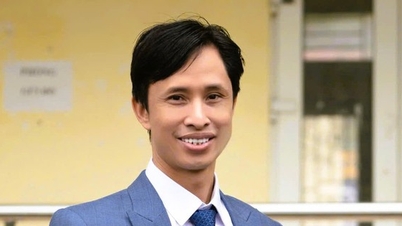Sophisticated methods and tricks
According to statistics, in Hai Phong there are currently about 40 banks with branches in operation; of which, the proportion of joint stock commercial banks accounts for over 80%, the rest are state banks, 100% foreign-invested banks. With the strong development of technology, the operations of banks in Vietnam in general and Hai Phong in particular are based on digital and electronic platforms with a strong breakthrough, the number of accounts opened by individuals and organizations, the number of online transactions has increased dramatically and become targets for subjects to target and take advantage of to carry out criminal activities.
According to Lieutenant Colonel Nguyen Van Hai, Deputy Head of the Cyber Security and High-Tech Crime Prevention Department, currently, high-tech criminals in the banking sector have many methods and tricks to defraud and appropriate assets.
Specifically, criminals often use ransomware attacks to encrypt all data in the computer system or network system of banks or individual customers who have transactions with the bank, then issue a notice or demand a ransom to decrypt the data; use spyware attacks through emails containing attached pdf files, sent to bank officers and employees. When the user opens the pdf file, the malware downloads data-stealing software to the victim's computer, allowing the criminal to remotely control the computer to eavesdrop on calls, attack other computers for the purpose of fraud or appropriation of customers' assets. For example, in September 2025, the Vietnam National Credit Information Center (CIC) under the State Bank of Vietnam was intentionally attacked by an international hacker group called ShinyHunters to steal data and sell it on an international forum.
Another trick of the subjects is to use technology platforms and connectivity features on cyberspace to fake the brand name of the bank and send messages containing fake links to the bank account login page. Many customers have trusted and declared to update information as requested from the fake website, leading to the disclosure of bank account information. By this trick, every year, criminals have appropriated billions of dong, causing significant damage and affecting the reputation of banks. Many subjects also use messages sent to customers with the content of money transfer, along with a link for confirmation. Some subjects also set up fake pages of some famous TV programs to steal social network account information, defrauding individuals in the victim's friend list to appropriate property.
From July 1, 2024, the State Bank stipulates that money transfer transactions of over VND 10 million will require biometric authentication to enhance security and prevent fraudulent activities. However, through reconnaissance, the Department of Cyber Security and High-Tech Crime Prevention discovered that criminals had collected victims' facial images from photos, videos or personal data exposed online, then used deepfake technology to create a copy of the face to fool the bank's biometric authentication system on the victim's device or a simulated device.
Or, the subjects send messages, emails, and make phone calls impersonating bank employees to request account upgrades, system maintenance, etc. to collect data when the victim installs. The subjects also impersonate bank, tax, insurance, etc. employees and trick the victims into authenticating transactions themselves to steal money. In addition, the subjects also attack via malware by sending links via text messages, messengers, zalo, etc. to steal OTP and biometrics.
According to Hai Phong City Police, the subjects also used many sophisticated tricks such as setting up fake telecommunication BTS stations to spread brand messages (SMS Brandname) of banks to steal information and user accounts; making fake payments for goods and services via POS (card payment acceptance points); taking advantage of the Swift payment system by exploiting and taking advantage of digital banks with lax security regulations in making money transfer orders.
Proactive prevention, enhanced response
Lieutenant Colonel Nguyen Van Hai, Deputy Head of the Cyber Security and High-Tech Crime Prevention Department, said that the reason for the increase in high-tech crimes in the banking sector, with complicated developments, is because online banking services are convenient and transparent, attracting users, but are easily violated by new attack techniques that are constantly emerging. The subjects no longer use basic tools but also take advantage of advanced software and techniques such as blockchain technology and data encryption to attack. Some banks have not paid much attention to raising awareness and knowledge of cyber security for employees and customers. Another reason is that high-tech crime groups are complexly organized, have experts in technology, finance, law and are concentrated in foreign locations.
To strengthen the fight against high-tech crimes, the leaders of the Department of Cyber Security and High-tech Crime Prevention, Hai Phong City Police requested banks to continue to coordinate with functional forces to disseminate legal knowledge, ensure network information security and safety; improve the capacity to protect the security and safety of the banking system; identify methods and tricks of criminal activities for employees and customers.
Banks also need to research and apply technology to their operations such as: open application programs (OPEN API), electronic customer identification and recognition technology (e-ID/e-KYC), virtual currency management and processing, dispute resolution, complaints in electronic transactions on the digital banking system...
In addition, banks also need to strengthen the effectiveness and efficiency of banking governance, tighten the management of electronic payment services and credit cards that banks have operated; proactively collect and provide information to authorities on cases related to fraud, appropriation of customers' assets in the banking sector, suspicious transactions related to money laundering, online gambling and other criminal acts and violations of the law to have strong enough sanctions against individuals and organizations that violate the law, especially acts of sending fraudulent text messages.
Banks also need to build digital services, integrated into the digital ecosystem for partners and third parties providing other services and goods; deploy measures to protect customer data and ensure continuous operation of information systems in digital banks; upgrade basic technology and security solutions that digital banks are deploying, especially firewalls, intrusion detection systems (IPS/IDS), anti-virus systems, multi-factor authentication for electronic transactions, and data encryption for important systems.
Many banks have also applied technology to ensure system security and protect customers, such as: Vietnam Joint Stock Commercial Bank for Industry and Trade ( Vietinbank ) has applied multi-factor authentication, data encryption, 24/7 security monitoring, invested in attack detection/prevention systems, periodic security testing; strictly controlled the process of opening and using accounts, applied eKYC (verifying customer identity online using modern technologies such as facial recognition, artificial intelligence (AI), digital signatures), biometric authentication, reviewing unusual accounts; applied AI, Machine Learning to detect unusual transactions, and provide early warnings.
Military Commercial Joint Stock Bank (MB Bank) uses tools to monitor, detect and prevent risks from users' devices; image detection technology when customers authenticate eKYC money transfers with suspected risks; applying advanced AI models, combining machine learning and deep learning, to analyze customers' transaction behavior and make decisions in a super short average time to identify and reject risky transactions...
In the first 9 months of 2025, the Department of Cyber Security and High-Tech Crime Prevention, Hai Phong City Police received and resolved 48 denunciations and reports of crimes, initiated criminal cases, and transferred 17 cases to the police for investigation. In all of the above cases, the subjects conducted transactions via bank transfer.
Source: https://baotintuc.vn/tai-chinh-ngan-hang/phong-chong-toi-pham-cong-nghe-cao-trong-linh-vuc-ngan-hang-20251119153040685.htm






![[Photo] The Standing Committee of the Organizing Subcommittee serving the 14th National Party Congress meets on information and propaganda work for the Congress.](https://vphoto.vietnam.vn/thumb/1200x675/vietnam/resource/IMAGE/2025/11/19/1763531906775_tieu-ban-phuc-vu-dh-19-11-9302-614-jpg.webp)

































![[Photo] General Secretary To Lam receives Slovakian Deputy Prime Minister and Minister of Defense Robert Kalinak](https://vphoto.vietnam.vn/thumb/1200x675/vietnam/resource/IMAGE/2025/11/18/1763467091441_a1-bnd-8261-6981-jpg.webp)
![[Photo] Prime Minister Pham Minh Chinh and his wife meet the Vietnamese community in Algeria](https://vphoto.vietnam.vn/thumb/1200x675/vietnam/resource/IMAGE/2025/11/19/1763510299099_1763510015166-jpg.webp)










































































Comment (0)